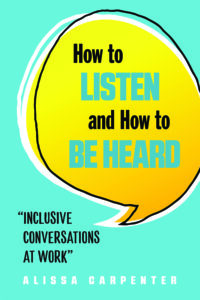Years ago when people would mention the need for an elevator pitch I would laugh. I mean how often was I going to be in a situation where I needed to explain what I did in 30 seconds? Now my much older self-wishes I came up with one sooner because I use it… ALL OF THE TIME. I’m constantly in positions where people want to know exactly what I do. It seems to be one of those basic questions like “how’s the weather?”
Knowing who you are, what you do and what you stand for is ESSENTIAL. This isn’t all about finding a new job or networking in a broader sense but everything to do with your personal brand. When you’re able to answer the 6 questions below, it will help clear up so much of fundamentally who you are.
Having an elevator pitch will make conversations easier, your professional goals more clear, and give you a direction for your life.
Let’s go through these questions together.
Who are you?
Literally, who are you? What is your name and how would you want others to refer to you? At the surface this seems easy but do you want to be referred to by a certain title or degree that you’ve earned? For example, Dr. ___, Mrs. ___, First Name only.
Think about how you would want to be introduced at a party to make it a little easier.
What do you stand for? Identify your values?
According to author and motivational speaker, Simon Sinek:
“PEOPLE DON’T BUY WHAT YOU DO; THEY BUY WHY YOU DO IT. AND WHAT YOU DO SIMPLY PROVES WHAT YOU BELIEVE”
Therefore, it’s important to ask yourself: What do you fundamentally stand for? What values do you uphold more than others’. This is vital to know as this is what drive your:
- Decisions
- Interactions with others
- Commitment to yourself
- Involvement with the community
- Type of companies and organizations you would work with or for
What are you looking for (personally and professionally)?
This is not only important to know if you’re looking for a job but what you’re looking for from your friends and family. Are you looking for:
- Trust
- Authenticity
- Honesty
- Sense of community
- Interest in personal development
- Growth in your career
Think about what exactly you’re looking for from yourself and from other people.
What are your unique skills, talents, strengths and qualifications?
Examine your uniqueness. What makes you tick that might be different from someone else? Think beyond the resume and look into things that make you stand out.
- Are you the one people come to when they need someone to talk to you?
- Do you keep your team organized and on track?
- Can you see things big picture?
- Do you spot issues or problems before anyone else?
- Do you give honest feedback that others are too afraid to give?
Think critically about what you bring to the table that can set you apart from the rest.
Why should someone talk to you, see you, use your services?
What do you do? This also might seem easy to identify at the surface but I want you to dig a little deeper. If you are a receptionist and answer phone calls and direct clients, think more about the “why you?” Is it because you go out of your way to do research to make sure they go to the right place and aren’t bounced around? Are you the first friendly face they see when they walk in the door?
If you’re in the creative industry, what do you do that sets you apart? Are you faster than other services? What personalized touch do you give that’s different? Is your business built to be more cost effective than others?
Why should someone use you versus someone else that might be offering the same services? Be specific! The better you’re able to identify your unique selling proposition (USP), the more you will stand out in the crowd!
What is your niche? Target market?
Who do you target and work with? If you’re a coach, what clients do you see and what problems are you trying to solve?
If you’re a blogger, who are you trying to reach? What does that person look like, do for a living, shop, live?
When you have a broad target market, it’s hard for people to relate to what you’re trying to do. By narrowing down what problem you’re trying to solve and for who-the more effective your elevator pitch will be. If not, you might be put on the spot to answer questions you’re not ready to answer.
Now, pull it all together. It doesn’t have to be in the order the questions are listed but it should flow and be genuine. Try this format:
I’m (Name), a (current position or what you’re looking for) working with (niche, target market). My [supervisors, friends, colleagues always say I] or [greatest strengths, talents] are (unique talents). It’s important to me that (values). I [stand out/am different from others] because (why someone should see you).
Now, PRACTICE. Say your pitch over and over until you can say it in your sleep. Remember, this should be 30 seconds or less and give the listener a foundational understanding of who you are and what you stand for.
What’s your elevator pitch? Share it with us in the comments below.
- Cultivating Relationships - July 20, 2021
- Empowering Our People - July 13, 2021
- Finding Purpose - July 6, 2021





This was so helpful – thank you! Doesn’t exactly follow the format, but here’s a first draft 🙂
My name is Melissa! I’m a photographer specializing in weddings, families, and events. The word that best describes my work is ‘saudade’ – it’s a Portuguese word that’s roughly translated to mean a bittersweet longing for something in the past – like the way you feel about happy memories from your childhood. I’m thinking about how you’re going to view your photographs 10, 20, 50 years from now. I care about this because I think love and relationships are the very best parts of life. Photographs are a way to deeply, permanently honor our relationships, which we often don’t think to do. My clients tell me over and over that they see something emotional, meaningful, and real about themselves, their families, their life events in my work, which is the greatest compliment I could ever receive.
This is great!! I’m so glad you worked on it and I love how you think about how your clients will not only view your work now but in the future!
Loving this! Always struggled with the elevator pitch.
It’s so hard! I literally practiced in a mirror haha
What a great post. Looks like I have something to do tomorrow. I am so getting my elevator pitch down pat.
I can’t wait to hear it. You’ll have to share when you’re done!
Great post and awesome tips!! <3
Thanks so muck Nicki!
hey, this is absolutely amazing! I have spent the past 30mins writing down the pointers. I am working on my elevator speech now and I plan to share with you when I am done. This is so great! woop woop woop!
This is not only useful for my 9-5 career but also for my the book I wrote when trying to market it!
Love this, it explains the process perfectly!
I’m going to put this on my to do list for next week!,
How did it go Valerie?
I found this to be an awesome breakdown of all of the aspects that i’ve used for my pitch. its a really simple guide that does a great job of laying out all of the important aspects of what people are looking for in a pitch. For me the key has always been trying to think from the other persons shoes. If i were an investor, or a user of a certain app, what am i looking to hear that will get me interested and engaged.
Win, I’m so glad that you found it useful. I completely agree-reflecting on what they actually want to hear and honestly thinking about your place within the space.
Wow, this is so amazingly detailed. When I first heard of an elevator pitch, I knew it was going to be challenging because I wanted to make sure I could tie in my full time job and my part time job as well because they’re equally important to me. So I found a way to incorporate both while still keeping it short and sweet. I use it SO MUCH and i can’t express how important it is to have an elevator pitch.
Thank you so much Kiara for your kind words! I think that can be the hardest part to tie in multiple pieces of a multipassionate lifestyle and I am so glad you were able to bring it all together!
Spot on!! Love it. This is the perfect process to follow.
Thanks so much Summer!
This is SO detailed and helpful! I love the idea of practicing your pitch and knowing it extremely well – I think that’s so important to know exactly WHAT you’re pitching! Great post!
Thanks so much Adriana and I couldn’t agree more. It’s so important to know what we are pitching!!